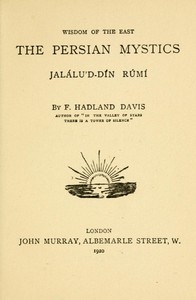The Persian Mystics: Jalálu'd-dín Rúmí
Author: Maulana Jalal al-Din Rumi
Bookshelves: Culture/Civilization/Society, Literature, Religion/Spirituality/Paranormal, Category: Biographies, Category: Religion/Spirituality

Summary
"The Persian Mystics: Jalálu'd-dín Rúmí" by F. Hadland Davis is a comprehensive exploration of Sufi mysticism, written in the early 20th century. The work delves into the life and teachings of the renowned Persian poet and philosopher Jalálu'd-Dín Rúmí, who is celebrated for his profound mystical insights and lyrical poetry. This study not only captures the essence of Rúmí's writings but also the foundational concepts of Sufism, emphasizing themes of love, divine unity, and the quest for spiritual enlightenment. At the start of the text, the author presents an introduction to Sufism, outlining its origins and historical context. Davis explains the significance of the term "Sufi," which refers to a group that originally rejected materialistic excess and instead embraced a life of simplicity and devotion. He establishes an intellectual framework by referencing various influences on Sufism, including Neo-Platonism, while emphasizing the unique contributions of early Sufis like Rābi'a and Mansur al-Hallāj. The opening portion sets the stage for a detailed examination of Rúmí's life and works, presenting Sufism as a rich tradition centered around the profound experiences of divine love and union with the Beloved. (This is an automatically generated summary.)
 LibraryManager
LibraryManager